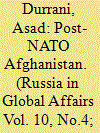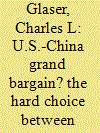| Srl | Item |
| 1 |
ID:
173918


|
|
|
|
|
| Summary/Abstract |
Calls for a greater inclusion of local actors have featured for some time in debates on how to make humanitarian action more efficient and address unequal power relations within the humanitarian system. Though the localisation agenda is at the core of current reform efforts in the humanitarian sector, the debate lacks a critical discussion of underlying assumptions – most strikingly, the very conceptualisation of the local itself. It is argued that the current discourse is dominated by a problematic conceptualisation of the local in binary opposition to the international, leading to blind spots in the analysis of exclusionary practices of the humanitarian sector. As such the localisation agenda risks perpetuating the very issues it wants to redress. A critical localism is thus proposed as a framework for much needed research on the localisation agenda.
|
|
|
|
|
|
|
|
|
|
|
|
|
|
|
|
| 2 |
ID:
139036


|
|
|
|
|
| Summary/Abstract |
Since the end of the Cold War, the United States has pursued a two-pronged strategy towards China. On the one hand, Washington has sought to engage Beijing across a wide range of domains, including through bilateral diplomacy, participation in multilateral institutions, trade, investment, scientific cooperation, educational and cultural exchange, civil-society initiatives and military-to-military dialogues. While activity in most of these areas extends back to the initial Nixon–Kissinger ‘opening’ to China in the late 1960s, since the early 1990s there has been a substantial broadening and deepening in each.
|
|
|
|
|
|
|
|
|
|
|
|
|
|
|
|
| 3 |
ID:
118611


|
|
|
|
|
| Publication |
2012.
|
| Summary/Abstract |
Afghanistan is a land of extreme diversity. Fractured along various fault lines - geographic, ethnic, tribal, linguistic, and sectarian - it would not have emerged as a single unified state but for a "grand bargain" struck between its major communities. And that would not have happened without compelling reasons.
|
|
|
|
|
|
|
|
|
|
|
|
|
|
|
|
| 4 |
ID:
086464


|
|
|
|
|
| Publication |
2009.
|
| Summary/Abstract |
One of the longest and most contentious international policy debates has swirled around the question of whether to destroy the last known stocks of the smallpox (variola) virus, which are preserved at two World Health Organization (WHO)-authorized repositories in Russia and the United States. Although smallpox was eradicated from nature more than three decades ago, concerns surfaced in the early 1990s that a few countries may have retained undeclared samples of the virus for biological warfare purposes. Because a smallpox outbreak would be a global public health emergency of major proportions, in 1999 the WHO approved a research program at the two authorized repositories to develop improved medical defenses against the disease.
|
|
|
|
|
|
|
|
|
|
|
|
|
|
|
|
| 5 |
ID:
138169


|
|
|
|
|
| Summary/Abstract |
China’s growing military power has fueled a security competition with the United States, increasing the risk of war between the two countries. To reduce this likelihood, the United States and China should negotiate a grand bargain in which the United States ends its commitment to defend Taiwan, and China agrees to resolve its maritime territorial disputes peacefully and accepts the United States’ long-term military presence in East Asia.
|
|
|
|
|
|
|
|
|
|
|
|
|
|
|
|